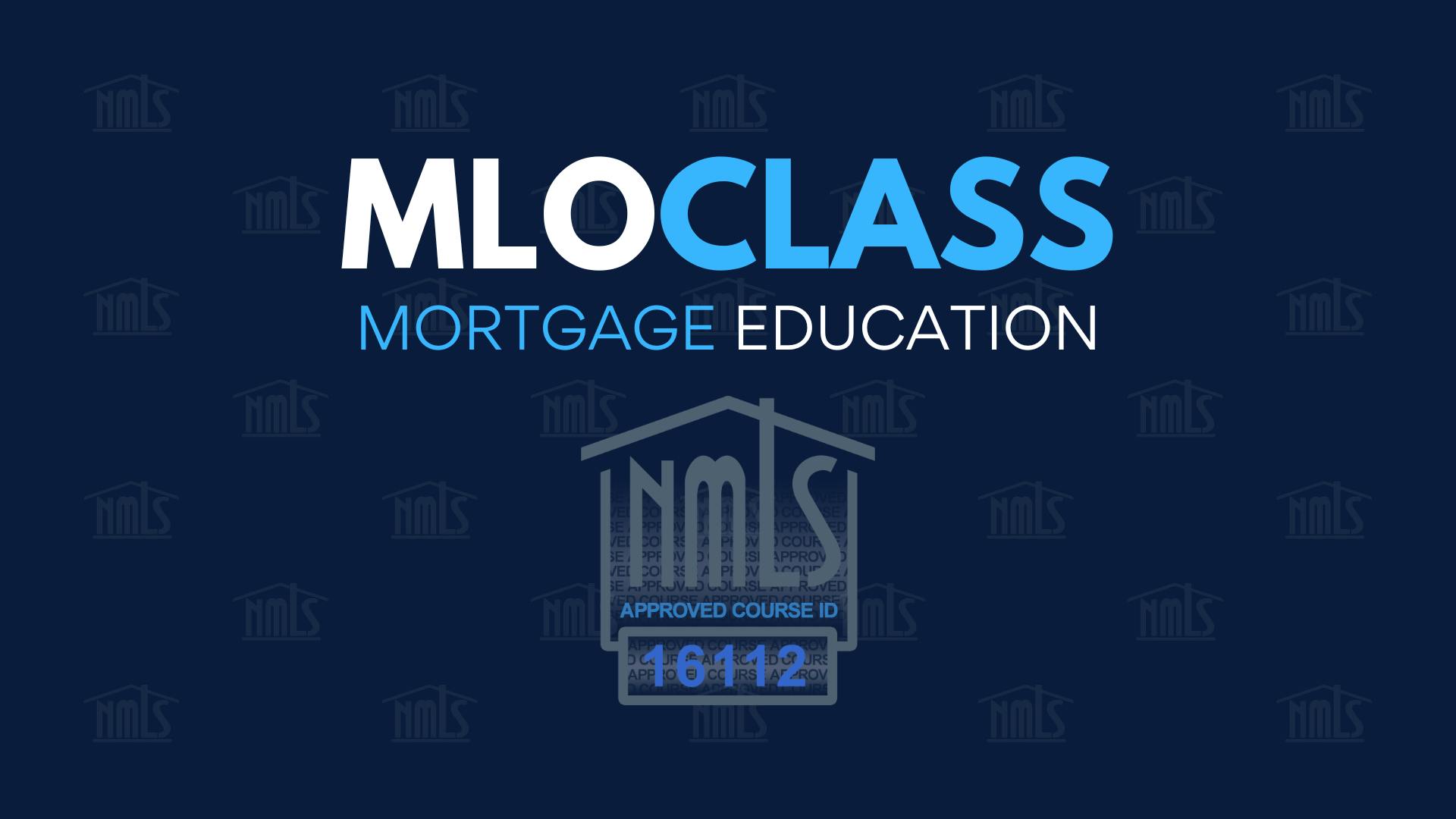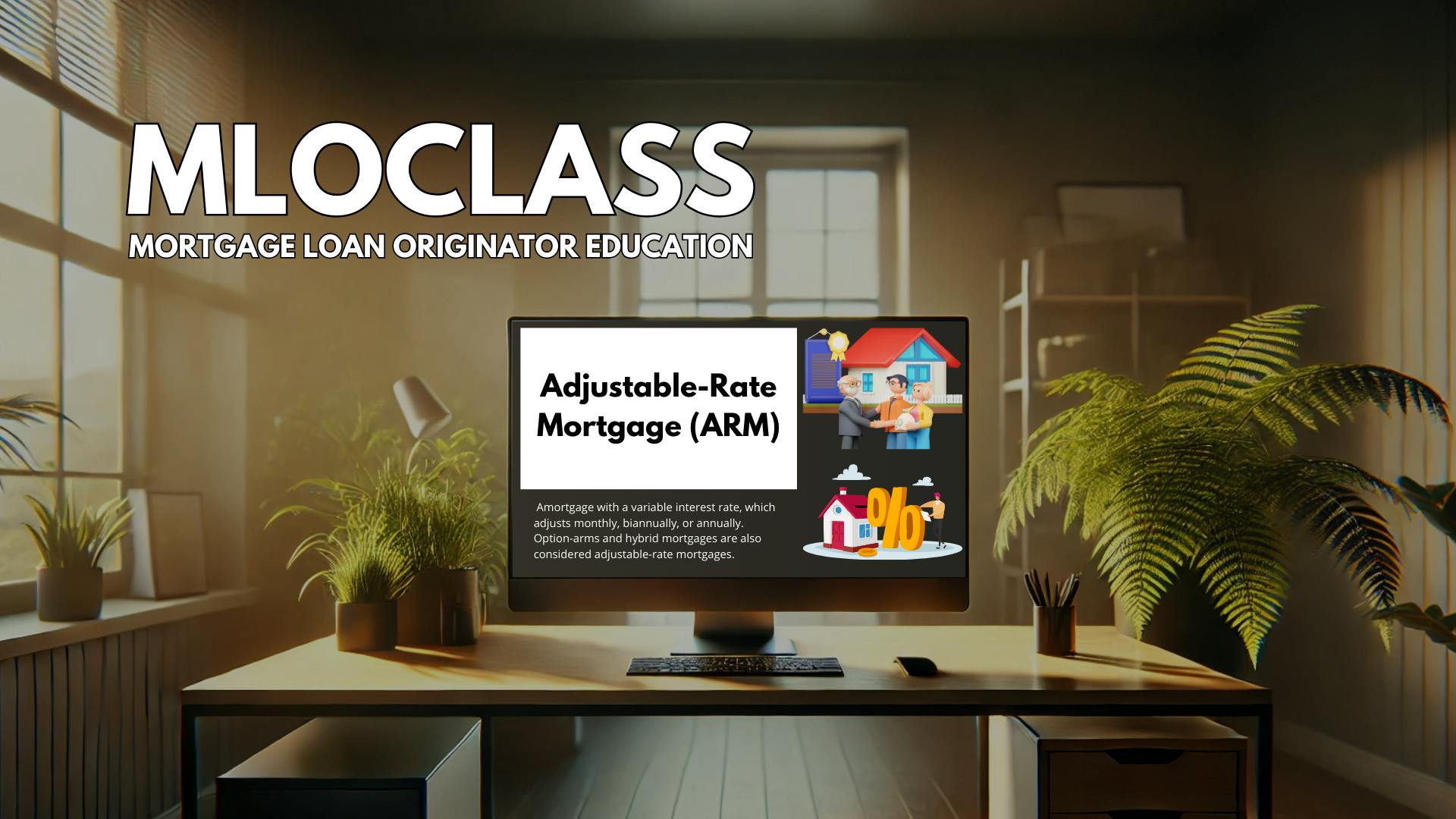Adjustable-Rate Mortgages (ARM): A Key Term for the NMLS Licensing Exam
At MLO Class, We Ensure That Our Students Have the Tools and Knowledge Needed to Pass the NMLS Mortgage Loan Originator (MLO) Licensing Exam

Get Licensed with MLO Class
-
Nationwide Multistate Licensing System (NMLS) Approved
-
Fully Online Mortgage Classes
-
Learn from Expert Mortgage Instructors
-
Student Services & Support
-
Proven Track Record of Success
-
Affordable and Flexible Pricing

Adjustable-Rate Mortgages (ARM): A Key Term for the NMLS Licensing Exam
As a student preparing for the Nationwide Mortgage Licensing System (NMLS) exam, understanding the key concepts and terms related to mortgage lending is crucial for success. One of the most important mortgage products you’ll encounter on the exam is the Adjustable-Rate Mortgage (ARM). At MLO Class, we ensure that our students have the tools and knowledge needed to pass the NMLS Mortgage Loan Originator (MLO) Licensing Exam, and mastering the concept of ARMs is a significant part of that preparation.
What is an Adjustable-Rate Mortgage (ARM)?
An Adjustable-Rate Mortgage (ARM) is a type of mortgage where the interest rate on the loan can change periodically, typically in relation to an index. Unlike a fixed-rate mortgage, where the interest rate stays the same throughout the life of the loan, an ARM starts with a fixed rate for a specified period and then adjusts based on market conditions.
Key Features of ARMs:
- Initial Fixed-Rate Period
The ARM begins with an initial fixed-rate period, which can last anywhere from 3 to 10 years, depending on the terms of the loan. During this period, the borrower enjoys a relatively low, stable interest rate.
- Adjustment Period
After the fixed-rate period ends, the interest rate begins to adjust periodically. Common adjustment intervals include annually or semi-annually.
- Index and Margin
The new interest rate is determined by adding a margin to a specific index rate. The most commonly used indexes include the LIBOR (London Interbank Offered Rate) or the SOFR (Secured Overnight Financing Rate).
- Rate Caps
These limit how much the interest rate can increase or decrease at each adjustment period (periodic cap) and over the life of the loan (lifetime cap). Caps are designed to protect the borrower from drastic increases in interest rates.
How ARMs Benefit Borrowers
For certain borrowers, ARMs offer a range of advantages. Here’s why some homebuyers might choose an ARM over a fixed-rate mortgage:
- Lower Initial Interest Rates
The starting interest rate for ARMs is often lower than that of fixed-rate mortgages, making them an attractive option for borrowers who plan to sell or refinance before the adjustment period begins.
- Flexibility
ARMs are particularly beneficial for borrowers who don’t expect to stay in their home long-term. If a homeowner is planning to sell within a few years, they can benefit from the lower rates without worrying about future rate adjustments.
- Potential for Lower Payments
If interest rates decrease over time, borrowers with ARMs could benefit from lower monthly payments during adjustment periods.
Types of Adjustable-Rate Mortgages (ARMs)
As a future Mortgage Loan Originator (MLO), you’ll need to understand the various types of ARMs available, as different loans have different structures and terms. Some of the most common ARMs include:
- 3/1, 5/1, 7/1, 10/1 ARMs
These ARMs are structured with a fixed rate for the first 3, 5, 7, or 10 years, after which the interest rate adjusts annually. The number before the slash indicates the length of the fixed period, and the number after the slash refers to the frequency of rate adjustments after the initial period.
- Interest-Only ARMs
These loans allow borrowers to pay only the interest for a certain number of years, after which they must begin paying both principal and interest. This can result in lower monthly payments initially, but they will increase once the interest-only period ends.
- Payment-Option ARMs
These ARMs offer borrowers flexibility in their payments by giving them the choice between different payment options each month, such as interest-only payments, minimum payments, or full principal and interest payments.
ARM Terminology to Know for the NMLS Exam
Understanding these specific terms and how they apply to ARMs is essential for your NMLS exam:
- Index
The benchmark interest rate that reflects general market conditions. ARMs adjust based on this index.
- Margin
A fixed percentage added to the index to calculate the new interest rate at each adjustment period.
- Adjustment Period
The frequency with which the interest rate can change after the initial fixed-rate period ends.
- Caps
These are limits on how much the interest rate or monthly payment can change during the adjustment periods.
- Periodic Cap: The limit on how much the interest rate can increase or decrease during any single adjustment period.
- Lifetime Cap: The maximum interest rate allowed over the life of the loan.
- Negative Amortization
Occurs when the monthly mortgage payments are less than the interest owed, causing the loan balance to increase over time.
Potential Risks of ARMs
While ARMs offer flexibility and potential savings, they also come with certain risks that borrowers must consider, and which will be covered in the NMLS exam. As a future MLO, it is essential to explain these risks clearly to clients:
- Payment Shock
When the interest rate adjusts upward, borrowers could face significantly higher monthly payments.
- Uncertainty
The borrower’s payments are not fixed for the life of the loan, which could lead to financial uncertainty in the long term.
- Negative Amortization
In some cases, particularly with payment-option ARMs, borrowers may end up with a loan balance that exceeds the original amount they borrowed.
ARMs and the NMLS Exam
To pass the NMLS Mortgage Loan Originator Licensing Exam, understanding ARMs is critical. The exam will test your knowledge of how ARMs work, their structure, and the benefits and risks associated with them. You’ll also be expected to apply this knowledge to real-world scenarios, advising borrowers based on their financial goals and market conditions.
Here at MLO Class, we provide comprehensive resources, including expert instruction, mock exams, and detailed explanations of mortgage terms like ARMs, to ensure you are well-prepared for your NMLS exam. Our courses are designed to make complex topics easy to understand, giving you the confidence you need to excel on exam day.
Master ARMs with MLO Class
Understanding Adjustable-Rate Mortgages (ARMs) is an essential part of your preparation for the NMLS exam. At MLO Class, we’re dedicated to helping you succeed by providing in-depth knowledge, real-world examples, and expert guidance. By mastering the intricacies of ARMs and other mortgage products, you’ll be well on your way to passing the NMLS exam and becoming a successful Mortgage Loan Originator.
Ready to master ARMs and other key mortgage concepts? Enroll in MLO Class today and take the next step toward a rewarding career in mortgage lending!

Complete Your Continuing Ed Requirements with MLO Class
The MLO Class Continuing Education (CE) Course is essential for Mortgage Loan Originators (MLOs) to maintain their licenses and stay updated with industry regulations, trends, and best practices. This course ensures MLOs remain compliant with legal requirements while enhancing their knowledge and skills, crucial for providing clients with informed and reliable mortgage advice. Enroll in the CE course to stay competitive in the mortgage landscape.
